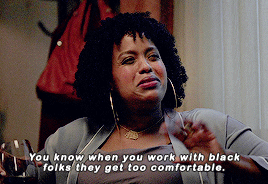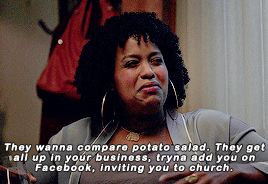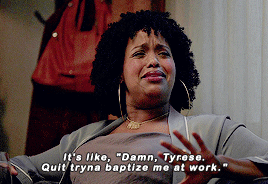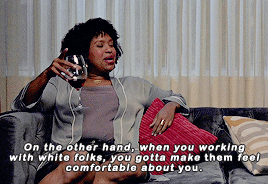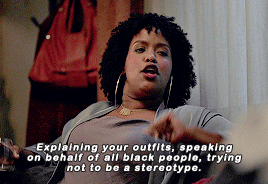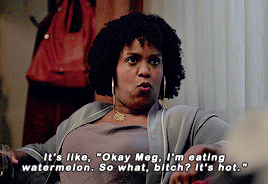There's been a lot of talk going around lately about the way HBO’s hit television show “Insecure” is lit with particular attention paid to the dark skin tones of the mostly black cast. That's kind of awesome. It’s the first time I've ever seen a mainstream discussion of how the film industry’s need for diversity interacts with the art of cinematography. The downside is that I don't really support the direction the discussion is heading.
Dark skin almost appears to glisten under Berkofsky's lighting.
Most of my feelings on the topic come from this article and this video by mic.com about “properly” lighting dark skin. The concept of even having a proper way is the problem to me. One of the show’s DP’s, Ava Berkofsky, discusses her methods of lighting, which revolve around under exposure with well-placed soft lights that create specular reflections on the skin. Although there isn't a lot of light hitting the actors, they still come off as sufficiently lit because of those reflections. I'm not trying to make any kind of criticism of her lighting style. Like most people I think “Insecure” is a beautifully shot show. The glaring problem I have is when its success in lighting is portrayed as the proper way to light dark skin, implying that other ways are wrong. It's the latest iteration of the oversimplification of the diversity of black people.
Issa’s friends touch on this racial simplification in the season 2 finale when they discuss black vs. white dominated work environments. Her friend, Kelli, talks about how working with white people as a black person means becoming the ambassador of the entire race. On the other hand working with black people means there will be the expectation of closeness and camaraderie that was never earned. Both environments lead to the same result of stripping black people of their uniqueness and impressing on them a one-size-fits-all set of traits to adhere to. That’s the danger with mic’s analysis of the show’s cinematography. It reduces all of our many shades, into a sorely inadequate binary.
Right and wrong, proper and improper don’t even enter the discussion when lighting white faces. We readily recognize that there is no formula that lights all white characters appropriately. Why aren’t black characters afforded that same respect? The most frustrating part of it is that much like Kelli’s workplace quandary we see this attitude coming from white and black people alike.
One of my favorite cinematographers and probably the foremost working black DP at the moment, Bradford Young, falls into this group. He's made quite a successful career out of his use of underexposure on indie breakouts like “Pariah” (2011), mainstream award contenders like “Selma” (2015) and also films with predominantly white casts like “Arrival” (2016). In an interview with Colorlines a few years back he said, “You’re doing black folk a great disservice when you overexpose their skin.” While I admire his work, I have to wholeheartedly disagree with this sentiment. We have to be open to being lit in all ways. Even if we were to suppose that underexposure was the pinnacle of beauty on dark skin, how could we forsake all the other qualities that make us human–especially the ones that aren’t so beautiful.
Davis stirred up controversy by portraying a black maid in "The Help" (2011)
Viola Davis once addressed some of the issues with these prescriptive views of blackness especially black womanhood by saying, “We are always overly sanctified [in movies], overly nurturing and overly sympathetic. And to find that place where you're messy, it's very difficult.” There is so much pressure as black artists to create positive images of black characters that it threatens to take away their three-dimensionality. Those same pressures are now seeping into cinematography to peel away the flexibility we have in photographing the incredible range of black performances we need in film. If we choose to make rigid rules for lighting black people then we will truly be doing ourselves a disservice.
-Sheldon J.

